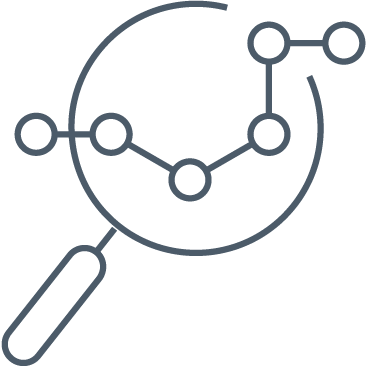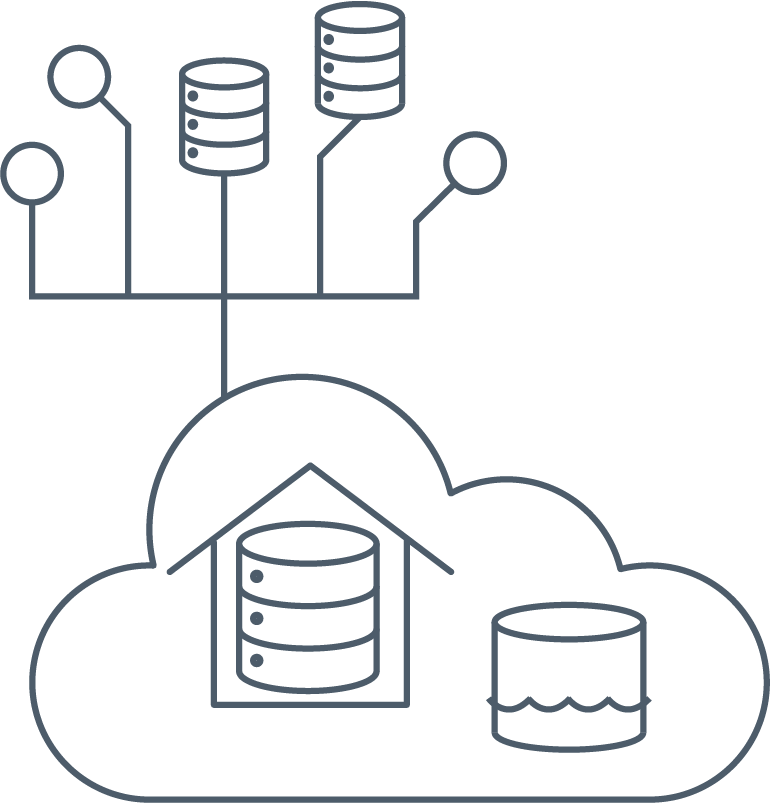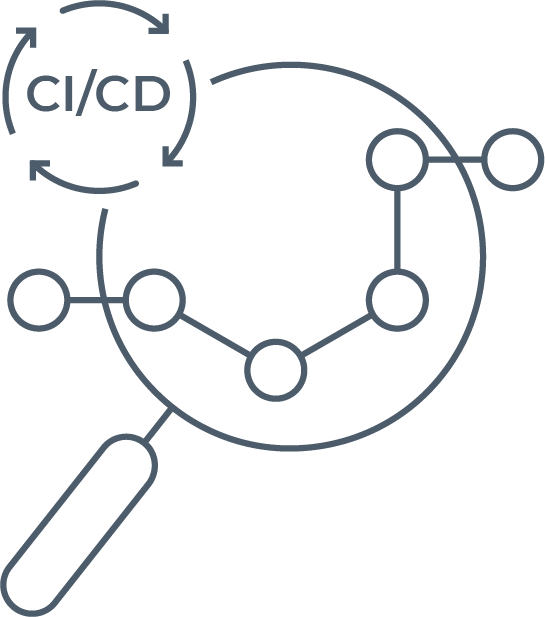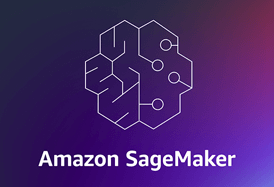 With data analytics and data visualization innovations continuing at a breakneck pace, organizations across industries are leveraging data analytics design services to transform their businesses. Whether mining data for business insights or improving customer experiences, artificial intelligence (AI), machine learning (ML) and deep learning are the tools that empower you to gain insights from the data you may already be collecting. At Cardinal Peak, we leverage in-depth experience at every stage of the data analytics journey — from initial road mapping to development and validation through release and CI/CD — to help you design, implement and refine your data analytics solution.
With data analytics and data visualization innovations continuing at a breakneck pace, organizations across industries are leveraging data analytics design services to transform their businesses. Whether mining data for business insights or improving customer experiences, artificial intelligence (AI), machine learning (ML) and deep learning are the tools that empower you to gain insights from the data you may already be collecting. At Cardinal Peak, we leverage in-depth experience at every stage of the data analytics journey — from initial road mapping to development and validation through release and CI/CD — to help you design, implement and refine your data analytics solution.
As an AWS Consulting Partner, we take advantage of the myriad of services, expert advice, well-architected design reviews, and development cost sharing AWS offers to provide end-to-end data analytics consulting services to our clients. By leveraging Amazon’s vast arsenal of tools — from data lakes like S3, data warehouses such as RedShift and the ML development suite of SageMaker — our data analytics experts shorten your development timeline.
Data Analytics Road Map & Design Services
Whether you’re newly implementing data analytics or simply expanding capabilities, our process begins with creating a road map. In concert with AWS, Cardinal Peak helps you develop a comprehensive strategy that outlines any near-term proof-of-concept (POC) tests necessary to refine the plan before full implementation. Through this process we come to understand your business needs along with your existing data infrastructure. Our typical road map document for data analytics consulting services includes sections on:
-
- Data Strategy
- Data Visualization
- Data Analytics
- Any Gating POCs
The roadmap prioritizes the development schedule and development path. If the development is greenfield then we can architect a serverless design that utilizes Amazon’s managed services. Or if you have a large existing on-premises system, we can containerize your code and move it to the cloud as efficiently as possible.
With the roadmap in hand, the development process starts with the implementation of the data strategy. This may include aggregating data in one location, a data lake, to make analytics and machine learning processing efficient. It may also include developing purpose-built data warehouses. Our goal is a well-architected, modern data strategy that supports easy data movement and provides unified governance and access control.
Machine Learning Consulting
Our machine learning (ML) practice includes both initial development and ongoing ModelOps. Step 1 of our development process includes architecting and developing the data strategy, as described above. Step 2 is the initial model development and training. In Step 3 (ongoing), the ModelOps team continuously improves the model(s) to be more accurate and to run faster.
To enhance your connected devices with embedded machine learning at the edge, check out our blog post on Harnessing TinyML to Revolutionize IoT Development.
Steps to Develop Machine Learning Models
 |  |  |
| 1. Implement Data Strategy | 2. Build & Train Initial Data Models | 3. Ongoing Tuning in CI/CD Environment |
|
|
|
| Tools & Services: Amazon S3, Redshift and others | Tools & Services: SageMaker – Data Wrangler, Feature Store, Clarify and more | Tools & Services: SageMaker – Clarify, Debugger, Pipeline, etc. |
Our data analytics design experts leverage SageMaker Studio for model creation and refinement. With SageMaker, we capitalize on our data strategy to easily connect and load data from S3 and Redshift. SageMaker Studio is composed of a series of tools that help with the entire lifecycle of ML models including data prep, model build, model training, deployment and ongoing refinement. Some of the SageMaker Suite tools we utilized include:
SageMaker Data Wrangler
Helps transform data into features for ML.
SageMarker Feature Store
Used to store features so they can be shared and used in other models too.
SageMaker Clarify
Used to ensure the model has high accuracy and is valid over the widest range, as well as remove data gaps and potential bias in the training data.
SageMaker Debugger
Used to systematically identify sources of slowness and error.
SageMaker Pipeline
Provides CI/CD capability to automate the machine learning development process.
Are you ready to explore how data analytics and visualizations can improve your operations? Reach out today to discover how our data analytics consulting services can help you.
Why Use AWS Tools for Data Analytics?
The reason we focus on AWS data analytics tools is two-fold. First, we want to be experts in our service offerings and focusing on the best cloud service ensures that we have that technical depth. This means that our engineers are Amazon certified and as a company we maintain an AWS Partner status. The second reason we focus on the AWS toolchain for data analytics is that we believe it brings the most benefits to our clients.
AWS provides a wide variety of tools and managed services that speed development and lower operational costs. Having the most serverless options at our disposal allows us to develop systems where you only pay for what you use. Since Amazon has invested (and continues to invest) in their managed services, it’s easy to create and manage your IT infrastructure as code. This means that our team can focus on your differentiated features rather than on basic IT infrastructure. It also means faster development cycles, lower IT burdens on your organization, and instant scaling of your applications. As the market leader, AWS’ costs are attractive, plus the flexibility of their systems allows us to fine tune your architecture to minimize your monthly bill.
In terms of data analytics, the toolchain is extensive, including all the components of the SageMaker Studio. This allows the development team to focus on making the best model without the costs associated with managing ML environments and infrastructure. The SageMaker tool suite is ideally suited to a CI/CD process so that your models continue to improve over time, strengthening your IP position and delighting your users.
AWS Solution Benefits for Data Analytics
| Scale | Serverless Designs | Low Operational Costs | Continuous Tool & Infrastructure Improvements | Future-Proof Solution |
Data Analytics Services Case Studies
Our AI, ML and data analytics services empower customers to bring best-in-class products to market quickly. Dive into the following case studies to learn more about our data analytics design services.

Streaming Data Analytics Platform on AWS
To support a global QC platform, we engineered an AWS solution using Kinesis for real-time streaming analytics and an S3 data lake, enabling powerful historical analysis and anomaly detection.

Medical Imaging Device Engineering
Utilizing carefully architected software and carefully crafted ML algorithms, this healthcare device design project highlights how our experts helped develop a unique portable medical device.

Leveraging Video & GenAI for Enhanced Visual Workflow Efficiency
By optimizing workflow automation with AI, video and AWS-powered solutions, Cardinal Peak helped WorkDone cut processing costs by 99%, enhance procurement efficiency and scale seamlessly.
To support a global QC platform, we engineered an AWS solution using Kinesis for real-time streaming analytics and an S3 data lake, enabling powerful historical analysis and anomaly detection.
Utilizing carefully architected software and carefully crafted ML algorithms, this healthcare device design project highlights how our experts helped develop a unique portable medical device.
By optimizing workflow automation with AI, video and AWS-powered solutions, Cardinal Peak helped WorkDone cut processing costs by 99%, enhance procurement efficiency and scale seamlessly.
Data Analytics Consulting Services FAQs
What Data Analytics Services and Tools Does AWS Offer?
For a deeper dive into AWS’s data analytics services, check out the table below.
| Category | Use Cases | AWS Service |
|---|---|---|
| Analytics | Interactive Analytics | |
| Big Data Processing | ||
| Data Warehousing | ||
| Interactive Analytics | ||
| Operational Analytics | ||
| Dashboards & Visualizations | ||
| Visual Data Preparation | ||
| Data Movement | Real-time Data Movement |
|
| Data Lake | Object Storage | |
| Backup and Archive | ||
| Data Catalog | ||
| Third-party Data | ||
| Predictive Analytics & ML | Frameworks & Interfaces | |
| Platform Services |
(Source: AWS)
What are Data Analytics Services?
Data analytics services help your business analyze raw data to uncover trends and opportunities, predict next steps and make decisions to optimize performance. The insights from data analytics can create new business models and revenue streams. Underlying technologies often include artificial intelligence (AI), machine learning (ML) and deep learning to support decision making and processes.
As AI and ML technologies evolve, many data analytics techniques and processes have been automated into data analytics services that help businesses optimize performance, perform more efficiently, maximize profit or guide more data-driven decision-making. Today, data analytics services can look at what happened, diagnose why something happened, predict what is going to happen or even help dictate what should be done next.
What is the Difference Between Data Analysis and Data Analytics?
While many people use the terms data analysis and data analytics interchangeably, there are a few key differences between the similar phrases. Data analytics involves looking at data to make decisions and perform necessary actions, while data analysis is a bit more specialized subset of data analytics that refers to specific actions and outcomes.
Data analytics consists of data collection and inspection, but data analysis focuses on defining, investigating, cleaning and transforming the data to deliver a meaningful outcome. Data analysis is a small but important part of the data analytics whole. While analytics tackles raw data to uncover trends and opportunities, predict next steps or make decisions, analysis usually narrows in on a single, already prepared data set to find useful information.
Data Analytics Design Services Related Articles
Want to learn more about our data analytics services? The following blog posts provide more in-depth details about how better understanding data can benefit your business.

Video: Our Visionary Approach to AI and Connected Solutions for Recurring Revenue

How To Do Sentiment Analysis with Amazon SageMaker

